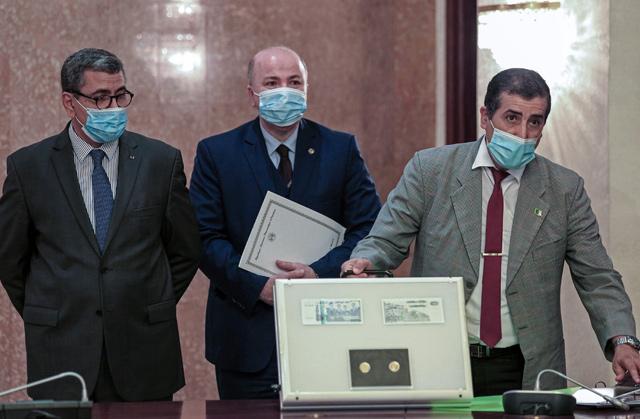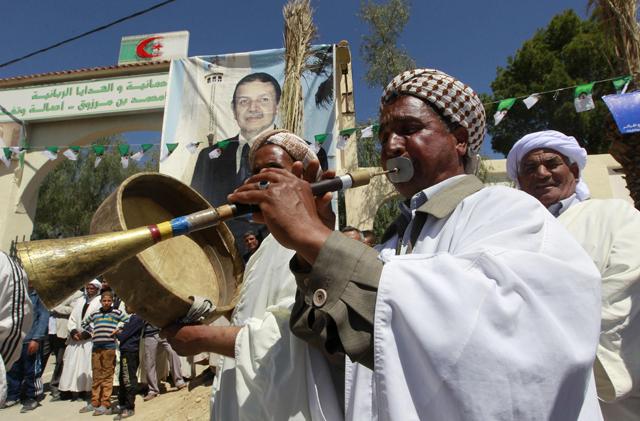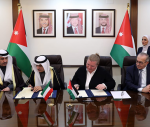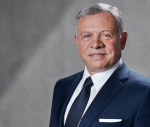You are here
Algeria economy rocked by one-two punch
By AFP - Aug 09,2020 - Last updated at Aug 09,2020

This photo, taken on July 4, shows Algerian Prime Minister Abdelaziz Djerad (left), Finance Minister Aymane Benabderrahmane (centre) and Governor of Bank of Algeria (Central Bank) Rosthom Fadli presenting samples of new banknotes and a coin commemorating resistance fighters against France’s colonial occupation of the country, during a ceremony in Algiers, a day ahead of the 58th anniversary of Algeria’s independence (AFP photo)
ALGIERS — Currency depreciation, inflation, negative growth, businesses closed: Algeria’s economy has been battered by the one-two punch of the coronavirus crisis and tumbling oil revenues.
Unless remedial action is taken on a massive scale, a slide into foreign debt will become inevitable, economists warn.
The National Office of Statistics has reported a 3.9 per cent fall in Gross Domestic Product (GDP) in the first quarter alone, with unemployment nearing 15 per cent — “alarming” figures, according to Mansour Kedidir, associate professor at the Higher School of Economics in Oran.
Excluding the energy sector, GDP fell by 1.5 per cent year-on-year in the 1st quarter, against an increase of 3.6 per cent last year compared to Q1 2018.
With confinement measures in place since March 19 to curb the spread of the novel coronavirus, sectors such as services and freight have come to a virtual standstill.
The construction sector, a major provider of jobs, has been paralysed for months.
Finance Minister Aymen Benabderahmane estimates the losses of state-owned enterprises at nearly 1 billion euros ($1.17 billion).
Private sector losses have yet to be assessed, but many closed businesses, including restaurants, cafes and travel agencies, risk bankruptcy.
Algeria faces an “unprecedented economic situation”, said Prime Minister Abdelaziz Djerad, who has also blamed mismanagement under the rule of ousted longtime president Abdelaziz Bouteflika.
Recession
Due to a lack of diversification, the Maghreb region’s largest economy is highly dependent on oil revenues and exposed to fluctuations in crude prices.
The International Monetary Fund (IMF) forecast that Algeria’s economy will shrink 5.2 per cent this year.
Kedidir predicts that unless reforms are brought in, “a Pandora’s box will be opened... riots, irredentism, religious extremism”.
President Abdelmadjid Tebboune has already ruled out seeking loans from the IMF or other international financial agencies, in the name of “national sovereignty”.
Algeria has painful memories of its 1994 recourse to the IMF and a structural adjustment plan that resulted in massive job cuts, shutdowns and privatisations.
‘New governance’
The government is about to launch an economic recovery plan and decided at the start of May to halve the state’s operating budget.
A 2020 complementary finance act is based on a decrease in revenues to around 38 billion euros, against the 44 billion euros initially forecast.
Experts say any solution will require drastic reforms.
Kedidir urged authorities to introduce lower interest rates, accounting for the informal sector and tax cuts based on the number of new jobs created.
He called for major projects such as agro-industrial zones in the country’s vast desert south, with processing infrastructure, extended railways lines and new towns to service them — all built with local manpower.
While acknowledging that hydrocarbons will remain the main revenue source for the next five to 10 years, an exit from the economic crisis must be based on new national and decentralised governance, says economist Abderahmane Mebtoul.
Algeria must “bring together all political, economic and social forces... [and] avoid division on secondary issues”, he said.
Mebtoul appealed for “a state-citizen symbiosis involving elected officials, companies, banks, universities and civil society in order to fight against a paralysing bureaucracy”.
Related Articles
Long held in suspicion in a largely state-controlled economy, Algerian businessmen are pouring cash into President Abdel Aziz Bouteflika’s re-election campaign, hoping to benefit from an expected fourth term for the incumbent.
ALGIERS — Algeria has launched Islamic finance products in a bid to attract money from the informal market, but bankers warn it will t
ALGIERS — Algeria said on Saturday that the coronavirus crisis on top of falling oil prices have caused unprecedented damage to its ec
















